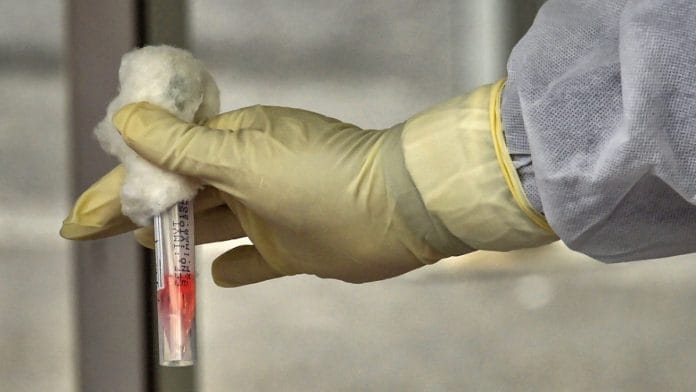New Delhi: The Covid-19 pandemic has brought the world to a standstill, even as scientists continue to look for treatments to fight the infection.
Here are some of the latest potential therapies being proposed by researchers across the world.
Clinical trials to test azithromycin paired with pneumonia drug
Scientists in the US have launched a clinical trial to test the combination of azithromycin and atovaquone in patients with moderate-to-severe Covid-19 infection.
Atovaquone — sold under the brand name Mepron — is used to treat or prevent pneumonia caused by a fungal infection.
The clinical trial, conducted by researchers at the Translational Genomics Research Institute, will be made available to patients in Arizona first. According to the team conducting the trial, this combination has been previously studied in other infectious conditions.
The combination has fewer risks of cardiac side-effects compared to other potential Covid-19 treatments. Laboratory modeling suggests that atovaquone may prove to be an active drug in the treatment of Covid-19.
The study will analyse throat swabs from Covid-19 patients as they undergo treatment. The team will measure the viral load as well as assess additional clinical and laboratory determinants to determine response to therapy.
Earlier, the now-popular hydroxychloroquine, or HCQ, went under similar trials.
Therapies targeting key brain regions could help patients with lung injury
Targeting the parts of the brain that control breathing and blood flow might help Covid-19 patients with respiratory disorders, and speed up the process of weaning them off ventilators, a study has suggested.
With respiratory infections, activation of the immune system is part of the normal, healthy response. However, in some Covid-19 patients, the immune response is so powerful that it leads to further lung damage called acute lung injury (ALI), and in its most severe form, acute respiratory distress syndrome (ARDS). Typical clinical care of patients with ALI and ARDS is focused on minimising further lung damage, using specialised forms of mechanical ventilation.
Researchers from Case Western Reserve University in the US suggest that the injury is not limited to the lungs, but may also have a lasting impact on the central control of respiration.
Targeting the parts of the brain that regulate our breathing might be an important therapy for weaning patients off ventilator support following recovery from ALI and ARDS.
Also read: New filter can trap ‘destructive’ proteins in Covid-19 patients, reduce fatalities
Men undergoing prostate cancer therapy at reduced Covid-19 risk
A study of 4,532 men in Italy has found that those who were being treated for prostate cancer with androgen-deprivation therapies (ADT) were less likely to develop Covid-19. Even if these people were infected, the disease was less severe, the researchers said.
The study, published in the leading cancer journal Annals of Oncology, suggests that ADT may protect men from Covid-19 infection.
The researchers found that out of 4,532 men infected with Covid-19, 9.5 per cent (430) had cancer and 2.6 per cent (118) had prostate cancer. Male cancer patients had a nearly twofold higher risk of Covid-19 infection out of the whole male population, and developed more severe disease.
However, when they looked at all prostate cancer patients, they found that only four out of 5,273 men on ADT developed Covid-19 infection and none of them died.
This compared to 37,161 men with prostate cancer who were not receiving ADT, of whom 114 developed Covid-19 and 18 died. Among 79,661 patients with other types of cancer, 312 developed Covid-19 and 57 died.
Blood thinners may reduce death risk for Covid-19 patients
Treating hospitalised Covid-19 patients with blood thinners that slow down clotting may improve their chances of survival, a new study said.
Published in the Journal of the American College of Cardiology, the study provides new insight into how to treat and manage Covid-19 patients once they are admitted to hospital.
The study found that hospitalised Covid-19 patients treated with anticoagulants had improved outcomes both in and out of the intensive care unit setting.
The research demonstrates that anticoagulants may prevent possible deadly events associated with the novel coronavirus, including heart attack, stroke, and pulmonary embolism. However, each case should be evaluated on individualised basis to account for potential bleeding risk, said the researchers.
They evaluated records of 2,773 confirmed Covid-19-positive patients admitted to five hospitals in the US between 14 March and 11 April, specifically looking at survival rates for patients placed on blood thinners versus those who were not.
The researchers took certain risk factors into account before evaluating the effectiveness of anticoagulation, including age, ethnicity and pre-existing conditions.
Also read: How styrene, chemical being blamed for Vizag gas leak deaths, affects human body






